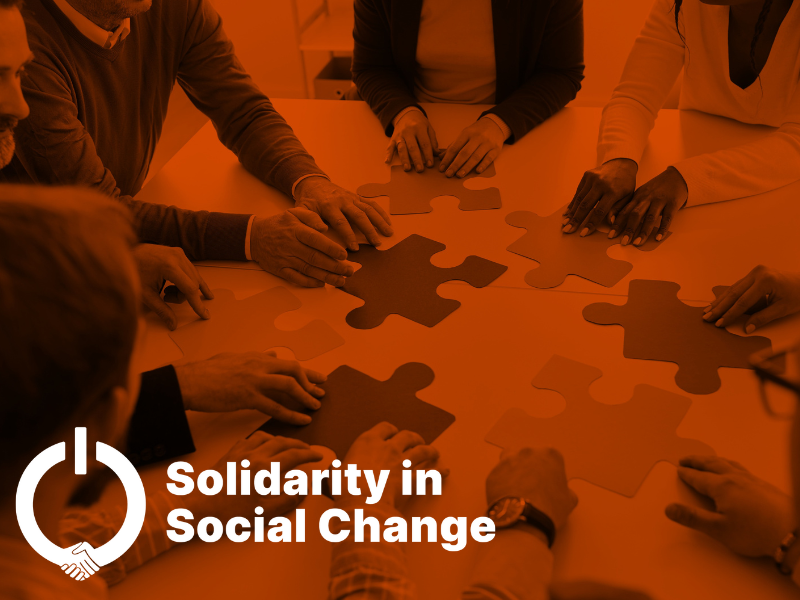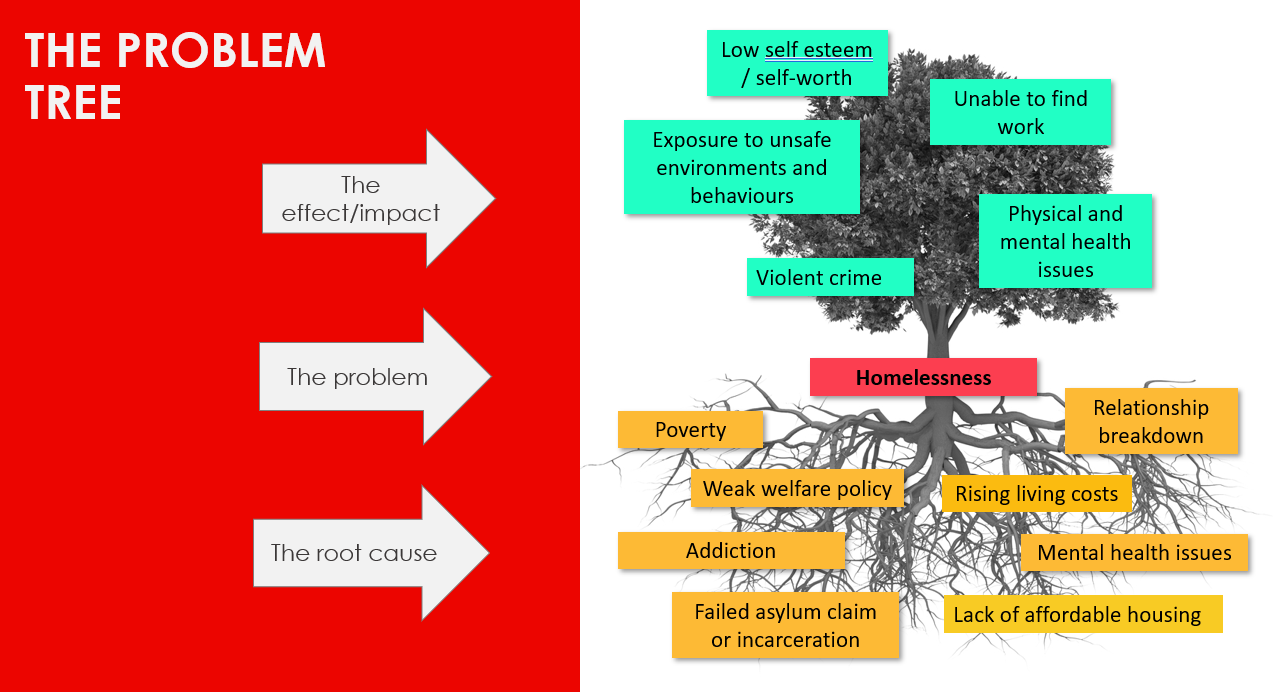The second in a four-part blog series bringing together theory and practice to explore effective campaigning through a solidarity lens. First, we introduce a tool for planning strategic campaigns. Then, we hear how INQUEST combine their expertise with the diverse skills and experience of bereaved families, to create powerful campaigns to end state-related deaths.
This series offers insights from Solidarity in Social Change, our programme for Oak Foundation’s UK Housing and Homelessness partners.
Analysing the problem
The Problem Tree is a helpful tool for digging deeper into the root causes of a social issue and ensuring shared understanding of its effects. For example, the Problem Tree can be used to unpack a complex systemic issue such as homelessness:
(Click image for larger version – will open in new window)
At a recent online event, SMK Associate Julia Beart described how this tool can be used by any individual to think through a complex issue. But, as a group exercise, it’s a great way to gather a range of knowledge and ideas, surface different perspectives and challenge assumptions. Used to structure a conversation between staff at an organisation and people from the communities they work with, the Problem Tree can help build a shared understanding and ensure everyone’s experience and expertise contributes to identifying the issue and planning a response.
Why this issue? Why now? And why you?
Having a clear, shared understanding of the issue can help answer some important questions to develop a strategic campaign. Which aspect of the issue are you trying to tackle, and why? Is it particularly timely and urgent, or has an opportunity arisen that makes change more achievable?
Just as important as understanding the need and opportunity is being clear about the contribution you – or those you work with – are best placed to make. Are you the right people to be pushing for change on this issue? Do you have a full enough understanding of it, and the expertise to make a difference? Who can help you?
When organisations and communities or individuals with first-hand experience work together, they have a wider set of insights and skills to draw on, which can lead to both greater legitimacy and greater impact. Together, you can plan campaign activities that best use your respective skills, networks and resources and map a path to change.
INQUEST: Bringing together first-hand experience and specialist knowledge to drive transformative change
One organisation that knows the value of bringing together diverse knowledge and experience to plan powerful campaigns is INQUEST.
For over 40 years, INQUEST have brought together the first-hand experience of bereaved families with specialist legal and professional knowledge, for their vital work to end state-related deaths. Their sensitive approach supports families to balance the personal toll that campaigning can take with their urge to drive transformative change.
Key to INQUEST’s approach is building strong, trusting relationships with bereaved families, and having a range of models for participating in a campaign. For example, their Family-Led Action Model is for situations where families feel able to take a lead, with specialist support such as communications and legal expertise provided by the INQUEST team. In other situations, their Family Participation Model is more appropriate, where leadership of a campaign is shared between INQUEST and families.
Any campaign requires a range of activity. INQUEST recognise that for some aspects of a campaign, such as lobbying a local MP, families are best placed – and trusted – to take action. For others, legal or other forms of technical expertise are needed. Bereaved families are at the centre of all INQUEST’s work, but the different skills and experiences that families and staff bring are valued equally. By clearly recognising their own professional role and expertise, INQUEST ensures families are given the support they need to lead or contribute to powerful campaigns.
In all their work, having honest, ongoing conversations is essential. Topics for discussion might include potential unintended consequences of taking certain action, or managing families’ expectations around how long change can take or how feasible a desired outcome might be at this time.
Not all organisations are as far along the path of solidarity in social change as this. But any organisation can take inspiration from INQUEST’s commitment to prioritising strong, trusting relationships, managing clear expectations, and thinking carefully about when to lead and when to offer support to a campaign.
Key to doing this well is being clear about the unique expertise and contribution you as an organisation can bring, while giving equal value to that of others. This means being honest about your limitations too. As a participant at our event reflected:
“Managing expectations is something we’re trying to work on at the moment. We’re in the middle of a project with loads of scope to involve people with first-hand experience. It’s been great, we have done exciting work together. This is unique for us because projects don’t always give us this freedom. We’re trying to be creative, while also understand the limits of our organisation. If we can’t do this much in all our projects, are there smaller steps we can take? Are there small shifts we can make until we can make the big shifts?”
Thanks to SMK Associate, Julia Beart, for sharing tools for planning strategic campaigns, and to Aniesha Obuobie and Lucy McKay for talking about INQUEST’s work at our event.
Further reading
See a quick explainer of the Problem Tree tool here. Read more about INQUEST’s approach here.
Co-written by Shaan Sangha (SMK’s Knowledge and Insight Manager) and Sarah Thomas (SMK’s Head of Power and Participation)


